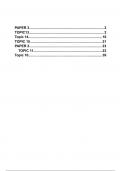PAPER3..............................................................................2TOPIC13..............................................................................2Topic14.............................................................................18TOPIC15...........................................................................21PAPER2............................................................................23TOPIC11........................................................................23Topic10.............................................................................39 PAPER3TOPIC13ExaminetheinfluenceofGermanforeignpolicyonthemajorEuropeanpowersbetween1890and1908.Anationsforeignpolicywieldsthepowernotonlytotransformandimpactisowntrajectorybutalsoinfluenceothernations.FollowingtheriseofKaieserWilhelm2,theintroductionoftheWeltPolitikforeignpolicysignificantlyreshapedEuropeandnyamics,fosteringamultifacedalliencesystem.Kaieser’sforeignpolychadthreemainaimsofestablishingaglobalnavalpresencetorivalothermajorpowers,acquiringandexpandingoverseascolonies,andassertingitselfasaleadingworldpowerthroughdiplomaticalliences.GermaniesextremeforeignpolicyambiotioncompelledBtritiantoabandonisolationism,sparkingtensionsexempilifiedbytheKrugerTelegramandintensifyingcompetitionfornavalsupremacy.France,alarmedbyGermanysgrowinginfluence,alliedwithRussiawhichsharedhostilitytowardsGernany.AdditionallytGermansforeignpolicyheightenedtensionduringtheMorroconcrisis.ForRussia,theterminationoftheReinsuranceTreatyledtotheformationofanewdualalliancesystem.Germany'ssupportfortheannexationofBosniain1908reflectsitsstrategicinterestsinbolsteringinfluenceintheBalkans.Germanforeignpolicybetween1890and1908exertedsignificantinfluenceonBritian,notablythroughtheexpansionofitsnavychallengingBritishnavalsupremacy,diplomaticclashesoverMoroccanaffairsleadingtoalignmentofFranceandBritainagainstperceivedGermanaggression,andtheKrugerTelegramincidentfuelingtensionswithBritainandcontributingtotheformationofalliances,notablytheTripleEntente.TheKaiser,admiringandenviousoftheBritishRoyalNavy,soughttobuildaGermannavywhichwouldchallengeBritishnavalsupremacyasapartofhisforeignpolicy.AnambitiousplantoincreasethesizeoftheGermannavywasdrawnupbyAdmiralAlfredvonTirpitzandimplementedintheNavallawsof1898and1900.TheFirstNavalLaw(1898)increasedthenumberofGermanbattleships;TheSecondNavalLaw(1900)doubledtheGermannavalfleet.Britainsawthisasathreattotheirnavalsuperioritytheyreviewedtheirpolicyof“splendidisolation”wheretheydidn’twanttobeinvolvedinconflictbetweenothernations,thusinterpretedthisasachallengetotheirdominanceoftheseas,andanimpliedthreattothesecurityoftheirempireforwhichastrongnavywasaprerequisit.GermanimperialintentionsledtodiplomaticclashesoverMoroccoin1905and1911andGermanyalsohadanaimofdeterioratingBritishandFrenchrelationswhichweregettingbetter.NorthAfricawasconsideredprimarilyaFrenchsphereofinterest,whichBritainsupportedaspartoftheAnglo-Frenchententein1904.WhenFrancemovedtoestablishmorecontroloverMoroccoin1905,Germanyobjected,claimingthatithadtobeconsulted.WhenFranceignoredGermandemands,theGermanmilitarythreatenedtoattackFranceifitsforeignministerwasnotreplacedandifFrancerefusedtoattendaninternationalconference toresolvethematter.FrancecompliedandduringtheAlgericasConferenceheldinSpainin1906,Britainfirmlysupporteditsententepartner,forcingGermanytoagreetoallowFrancetoextendfurthercontroloverMoroccoundercertainminorconditions.In1911,FrancesenttroopsintoMorocco,causingGermanytoproclaimtherighttodothesameinsouthernMorocco.AgainBritainandFranceresistedGermanmovesanddemands,forcingGermanytoaccept275,000km2ofFrenchCongoinstead.TheententebetweenBritainandFrancewasstrengthened.Germany'sassertiveactionsinthesecolonialarenasplayedaroleinthealignmentofpowers,withFranceandBritainfindingacommoncauseagainstperceivedGermanaggression.TheKrugertelegramis(1896),amessagesentbyGermany'sKaiserWilhelmIItoKruger(presidentofTransvaalRepublic)congratulatinghimonresistingaBritishmilitaryattact,theJamesonRaid,whichsonsitedof600Britishmenattempingtotriggerananti-governmentuprising.Despitethis,65ofthoseprotestreswerekilledandtherestsurrendered.TheKrugerTelegramcausedapublicoutcryinBritain.NewspapersandpoliticalleaderscriticizedKaiserWilhelmIIforhisperceivedmeddlinginBritishcolonialmattersandforsidingwithapotentialadversary.Theincidentfueledanti-GermansentimentamongtheBritishpublicandintensifiedcallsforarobustresponsefromthegovernment.TheBritishgovernmentconsideredtheKrugerTelegramasadirectchallengetoBritishauthorityandinterestsinSouthernAfrica.Whiletheinciddentcanappearminor,thetensionbetweenthenationslasteduptotheWW1andwasadecidingfactorinthedevisionofAlliences.ThedevelopmentofthetripleententeandthecentralpowerswaspartiallyduetotheincreaseintensionbetweenGeramnyandBritianasBritainwasnowmorecloselydriventoFranceandRussia. Germanforeignpolicybetween1890and1908significantlyinfluencedBritainthroughtheexpansionofitsnavychallengingBritishnavalsupremacyanddiplomaticclashesoverMoroccanaffairs,whichintensifiedtensionsandcontributedtotheformationofalliancessuchastheTripleEntente.ThefailuretorenewtheReinsuranceTreatybetweenGermanyandRussiain1890significantlyescalatedtensionsinEuropeandreshapedthegeopoliticallandscapeinseveralways.TheReinsuranceTreatywasadiplomaticagreementbetweentheGermanEmpireandtheRussianEmpirethatwasineffectfrom1887to1890.Theexistenceoftheagreementwasnotknowntothegeneralpublic,andassuch,wasonlyknowntoahandfulofofficialsinBerlinandSt.Petersburg.ThetreatyplayedacriticalroleinGermanChancellorOttovonBismarck'snetworkofalliancesandagreements,whichaimedtokeepthepeaceinEuropeaswellasmaintainingGermany'seconomic,diplomaticandpoliticaldominance.IthelpedcalmtensionsbetweenbothRussiaandGermany.Mosthistorians,accordingtoNormanRich,agreethattheReinsuranceTreatyitselfwasnotofgreatimportancewhileitwasinoperation,butthefailuretorenewitmarkedthedecisiveturningpointofRussia'smovementawayfromGermanyandtowardFrance.Additionally,thefailureoftheReinsuranceTreatyandtheformationofadualalliancewithAustria-HungaryduetoGermany'sforeignpolicyfurtherexemplifytheintricatedynamicsshapingEuropeangeopoliticsinthelead-uptoWorldWarI ExaminetheimpactofdomesticconditionsonGermanforeignpolicybetween1890and1914.Theintricateinterplaybetweenanation'sdomesticconditionsanditsforeignpolicyisafundamentalaspectofinternationalrelations.Whetheracountryexhibitsinternalweaknessesorstrengths,thesefactorsinvariablyinfluenceitsinteractionsontheglobalstage.ThisdynamicrelationshipisparticularlyevidentinthecaseofGermanyduringthetransformativeperiodbetween1890and1914.DuringWilhelm'sreign,Germanyunifieddomesticallyandrapidlyindustrialized,becomingaleadingeconomicpower.Thiseconomicgrowthfueledmilitarystrengthandimperialambitions,leadingtoanexpansionistforeignpolicythatutilizedresourcestofulfillitsobjectives.Thedesiretocompetewithothereuropeanpowersparticularlybritainandtoassertgermaniesstatusasaworldpowerformedmilitaristicgermanyforeignpolicy.Navalsupremacybecameakeyaspectofitsforeignpolicy,especiallyinthepursuitofWeltpolitik.TheGermanpopulation,drivenbythecommercialandindustrialmiddleclassandthegrowinglowerclass,supportedimperialistpolicies.Militarismalsoinfluencedpublicopinion,leadingtoadesireforexpansionreflectedinforeignpolicydecisions.TheeconomicandindustrialgrowthexperiencedbyGermanyfollowingits1871unificationplayedapivotalroleinshapingitsforeignpolicyobjectives,particularlyduringWilhelm'sreignfrom1888to1918.Thistransformativeperiodwitnessedremarkableadvancementsinvarioussectors,withconcreteevidencehighlightingthesignificantimpactofindustrializationonGermany'sriseasaglobalpower.Onepieceofevidenceliesintheexpansionofcoalproductionandironmining.Germany'scoalproductiontripledbetween1871and1913,makingitthelargestproducerinEuropebytheearly20thcentury.Similarly,ironminingexperiencedsubstantialgrowth,withGermanybecomingtheleadingproducerofironoreinEurope.ThissurgeincoalandironproductionformedthebackboneofGermany'sindustrialbase,providingtherawmaterialsnecessaryformanufacturingandinfrastructuredevelopment.ForeigninvestmentalsoplayedacrucialroleinGermany'seconomicgrowth.Theinfluxofcapitalfromabroadfueledindustrialexpansionandmodernization,allowingGermanindustriestoadoptthelatesttechnologiesandincreaseproductivity.Bytheturnofthecentury,Germanyhadbecomeamagnetforforeigninvestorsseekinglucrativeopportunitiesinitsboomingeconomy.ThecorrelationbetweeneconomicprosperityandmilitarystrengthduringWilhelm'sreignisevidentintheexpansionandmodernizationoftheGermanArmyandNavy.TheincreasedindustrialoutputprovidedtheresourcesneededtobuildaformidablemilitaryforcecapableofcompetingwithotherEuropeanpowers.By1914,Germanyhadthesecond-largestnavyintheworldandoneofthemostwell-equippedarmiesinEurope,atestamenttothedirectlinkbetweeneconomicgrowthandmilitaryprowess.Furthermore,theeconomicboomfueledGermany'simperialambitionsand territorialexpansion.TheacquisitionofcoloniesinAfricaandthePacific,alongwiththepursuitofterritorialgainsinEurope,exemplifiedGermany'sdesireforeconomicdominanceandgeopoliticalinfluence.Thevastresourcesaccumulatedthroughindustrializationprovidedthemeanstosupporttheseimperialisticventures,highlightingtheintimateconnectionbetweeneconomicprosperityandimperialexpansion.Inconclusion,theeconomicandindustrialgrowthexperiencedbyGermanyfollowingunificationprovidedtangibleevidenceofitsemergenceasadominantforceinglobalaffairs.Theexponentialgrowthincoalproduction,ironmining,andforeigninvestment,coupledwiththeexpansionandmodernizationofthemilitary,underscoredthesignificantimpactofindustrializationonGermany'srisetopower.Thesedevelopments,inturn,shapedGermany'sforeignpolicyobjectives,pavingthewayforaperiodmarkedbymilitarism,nationalism,andterritorialexpansionunderWilhelm'sreign.ThedesiretocompetewithotherEuropeanpowers,particularlyBritain,andthebeliefinthenecessityofastrongmilitaryforGermany'sstatusasaworldpowersignificantlyinfluencedGermany'sforeignpolicyofmilitaryexpansionbetween1871and1914.Germany,newlyunifiedunderPrussianleadershipin1871,soughttoestablishitselfasaleadingEuropeannation.Toachievethisgoal,GermanleaderKaiserWilhelmII,pursuedapolicyofmilitarybuildupandexpansiontorivalthenavaldominanceofBritainandassertGermany'sinfluenceontheglobalstage.OnedrivingforcebehindGermany'smilitaryexpansionwasitsaspirationtochallengeBritain'snavalsupremacyandestablishaformidablenavyofitsown.TheBritishRoyalNavyhadlongbeenthedominantnavalpower,controllingcrucialsearoutesandmaintainingcoloniesaroundtheworld.Inresponse,GermanyinitiatedanambitiousnavalconstructionprogramaimedatcreatinganavycapableofchallengingBritishnavalhegemony.theGermanNavyLawof1898initiatedasignificantexpansionoftheGermanImperialNavy,withplanstobuildapowerfulfleetcapableofrivalingtheBritishRoyalNavy.TheconstructionofapowerfulnavywasseenasessentialnotonlyforsecuringGermany'smaritimeinterestsbutalsoforenhancingitsprestigeandstatusasaglobalpower.Thelate19thandearly20thcenturiesweremarkedbyintensecompetitionamongEuropeanpowersforcolonialterritories,economicresources,andstrategicadvantages.Germany'sleadersbelievedthatastrongmilitarywasindispensableforsafeguardingitsterritorialintegrity,protectingitsinterestsabroad,andprojectingpowerontheEuropeancontinent.TheacquisitionofterritoriesinAfricaandthePacific,suchasTogo,Cameroon,andGermanNewGuinea,reflectedGermany'sdesiretoestablishoverseascoloniesandsecureaccesstovitalresourcesandmarkets..MilitaryexpansionwasviewedasameansofconsolidatingGermany'spositionasamajorplayerinEuropeanpolitics.Additionally,thebeliefintheimportanceofmilitarystrengthfornationalprestigeandsecuritywasdeeplyingrainedinGermanpoliticalandculturaldiscourseduringthisperiod.MilitaryprowesswasequatedwithnationalgreatnessandwasseenasessentialformaintainingGermany'sstatusasaleadingEuropeanpower.Thisperceptionwasfueledbyacombinationoffactors,includinghistoricalprecedent,nationalistsentiment,andtheinfluenceofmilitaristicideologies.Asaresult,Germanypursuedapolicyofmilitaryexpansioncharacterizedbysignificantinvestmentsinmilitarytechnology,infrastructure,andpersonnel,aimedatenhancingits capabilitiesandprojectingstrengthbothregionallyandglobally.Insummary,Germany'sforeignpolicyofmilitaryexpansionbetween1871and1914wasshapedbyitsdesiretocompetewithotherEuropeanpowers,particularlyBritain,anditsbeliefinthenecessityofastrongmilitaryforassertingitsstatusasaworldpower.NationalismandPublicSentimentplayedasignificantroleinshapingGermany'simperialisticforeignpolicyduringthelate19thandearly20thcenturies.ConcreteevidencehighlightstheinfluenceofvarioussegmentsoftheGermanpopulationonforeignpolicydecisionsduringthisperiod.Firstly,thesupportoftheGermanpopulation,particularlythecommercialandindustrialmiddleclass,forimperialisticpoliciesiswell-documented.Thissegmentofsocietysoughtimperiallandstoexpandtheireconomicactivities,viewingterritorialacquisitionasessentialforfurtheringtheircommercialinterests.Thedesireforeconomicgrowthandincreasedprosperitydrovetheirbackingofimperialventuresandexpansionistpolicies.Moreover,therapidlygrowinglower-classpopulationalsoexertedinfluenceonGermanforeignpolicy.Asthissegmentofsocietyexpanded,sodidthepressurefortheacquisitionofnewterritories.Economicopportunitiesandthepromiseoflandabroadappealedtothelowerclass,promptingapushforterritorialexpansionasameansofaddressingdomesticsocioeconomicchallenges.Militarismemergedasanothercrucialfactorshapingpublicsentimentandinfluencingforeignpolicydecisions.ThegrowingmilitaristicfervorwithintheGermanpopulationbolsteredsupportforaggressiveexpansionistpolicies.MilitarystrengthwasperceivedasessentialforsafeguardingnationalinterestsandmaintainingGermany'sstatusasaworldpower,leadingtoanalignmentbetweenpublicsentimentandthepursuitofimperialisticgoals.Inconclusion,thealignmentofNationalismandPublicSentimentwithimperialisticforeignpolicyobjectivesinGermanyduringthelate19thandearly20thcenturiesisevident.Thesupportofvarioussegmentsofthepopulation,includingthecommercialandindustrialmiddleclass,thegrowinglowerclass,andproponentsofmilitarism,underscoredthewidespreadbackingforterritorialexpansionandaggressiveforeignpolicyinitiatives.ThisalignmentbetweenpublicsentimentandimperialisticaspirationshighlightsthesignificantroleplayedbysocietalfactorsinshapingGermany'sforeignpolicyduringthisperiod. 26.TowhatextentdidUSentryintotheFirstWorldWarcontributetoAlliedvictory?TheFirstWorldWar,oneofthemostcataclysmicconflictsinhumanhistory,sawtheconvergenceofglobalpowersinastrugglefordominance.Amidstthischaotictheatreofwar,theentryoftheUnitedStatesplayedapivotalroleintippingthescalesinfavoroftheAlliedpowers.TheimpactoftheUnitedStatesonlandduringWorldWarIwasprofound,asevidencedbythedeploymentoftroopstotheWesternFront,technologicalsuperiority,andinnovativeleadership,significantlycontributingtoAlliedsuccess.Furthermore,Americannavalforcesplayedacrucialroleatsea,securingvitalsealanesanddisruptingGermannavaloperations.MoroverUSA’seconomiccontrubituionsinformofmanufacturingextensiveamountofmilitarywarfarealsoaidedAlliedVictory.Howeverotherfactorssuchasweaknessofthecentralpowers,botheconomicallyandpolitically,andstrategicallyandAlliedpowersstrengthcouldhavecontributedtoAlliedvictory.TheimpactoftheUnitedStatesonlandduringWorldWarIwasprofoundandplayedasignificantroleintippingthebalanceinfavoroftheAlliedside,specifficalythedeploymentofAmericantroopstotheWesternFront,whichbolsteredAlliedmanpowerandprovidedfreshreinforcementstothewar-wearyEuropeanforces.ThearrivalofAmericansoldiersinFranceinjectednewenergyandmoraleintotheAlliedarmies.Americantroops,equippedwithmodernweaponssuchastheM1903Springfieldrifle,BrowningAutomaticRifle(BAR),andM1911pistol,andtrainedinmodernwarfaretactics,helpedtooffsettheheavylossessufferedbytheAlliesduringtheprolongedtrenchwarfareontheWesternFront.Thesesoldiersbroughtnewfirepowerandtacticstothebattlefield,contributingtotheAlliedadvanceandeventualvictoryovertheCentralPowers.TheirpresenceonthebattlefieldhelpedtorelievepressureontheAlliedforcesandcontributedtotheoverallmomentumoftheAlliedadvance.Moreover,theUnitedStates'industrialcapacityplayedacrucialroleinsupplyingtheAlliedwareffortwithmunitions,equipment,andsupplies.TherapidmobilizationofAmericanindustrytransformedthebalanceofpoweronthebattlefield,providingtheAllieswithasteadystreamofresourcesnecessarytosustaintheiroffensiveoperations.AmericanmilitaryleadershipalsomadeimportantcontributionstotheAlliedwareffort.GeneralJohnJ.Pershing,commandingtheAmericanExpeditionaryForces,implementedinnovativetacticsandstrategiesthathelpedtobreakthestalemateontheWesternFrontandpushbackGermanforces.Inconclusion,theimpactoftheUnitedStatesonlandduringWorldWarIwasinstrumentalinsecuringvictoryfortheAlliedside.Throughthedeploymentoftroops,industrialmobilization,militaryleadership,andstrategicsupport,theUnitedStatesplayedacrucialroleinshapingtheoutcomeoftheconflictandachievingAlliedsuccessontheWesternFront.TheimpactoftheUnitedStatesatseaduringWorldWarIwassignificantandcontributedto




